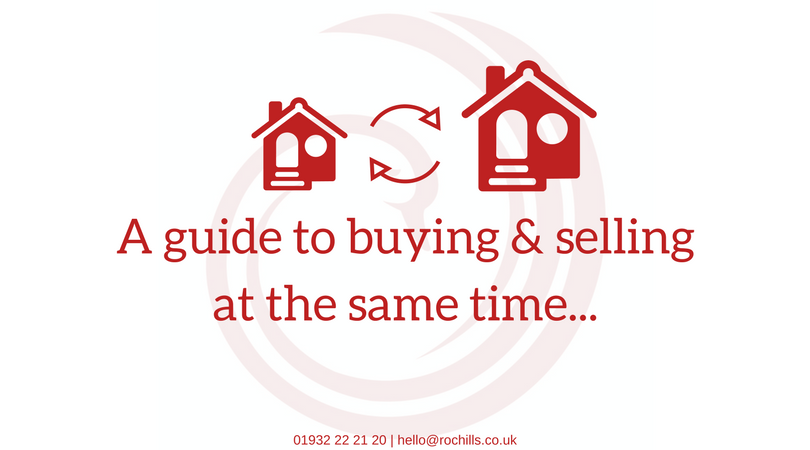A property chain can cause dreaded chaos, which can end up with complications at the last minute. So, take a look at the steps you can take to help reach those milestones more smoothly if you find you’re having to buy and sell at the same time.
In an ideal world, you’d sell your home within moments of putting it on the market and then have all the time in the world to find your next dream home while your buyers wait patiently until you’re ready to move. Unfortunately, we don’t live in an ideal world and in most cases you’ll find yourself in a chain. Sigh…
Whilst it’s very common to find yourself in a chain, property chains can cause significant annoyances, so if you’re planning to buy and sell at the same time, make sure you’re prepared.
Get your property valued
Before you start making plans to buy your new home, you need to get a clear idea of how much your current home is worth. Start online with our free instant online valuation tool. Then arrange for at least three local estate agents to give you their valuation. This is a chance for them to apply their local knowledge and take account of any unique features or home improvements which add value to the property, so you can get the most accurate figure. It is worth bearing in mind that some agents are renowned for giving an overly high valuation in order to get your business. So, by getting three agents to value your home, you are hopefully reducing the risk of setting off with an asking price you have to reduce a few weeks down the line.
Work out your finances
Start by getting your head round your finances; how much can you comfortably afford to spend on your next house? How much equity do you have in your current home?
Then there is the chain to consider. When you exchange contracts on the property you want to buy, you’ll need to pay a deposit. You should exchange on the same day as your buyer exchanges, and therefore you’re able to use the deposit they pay you to pay your deposit on the property you’re buying. Still with us?..
However, if your new house is more expensive than your current house it’s likely that the deposit required will be more than the deposit you receive. If this is the case, it may be that your solicitor can agree with your seller’s solicitor that the smaller deposit will be enough. If this isn’t possible, you’ll need to find the extra cash. It’s worth checking to see if you’re financially able to do this before you start the process.
You should also bear in mind additional costs such as stamp duty. You should be able to absorb this into your mortgage borrowing – but it’s a substantial cost to be aware of it.
Speak to a mortgage broker
If this is bamboozling you already, then a mortgage broker will help guide you on finding the right solution. That may involve re-mortgaging or porting your mortgage. The latter involves transferring your existing mortgage to your new property. Either way, a whole of market mortgage broker will be able to help.
For fee free mortgage advice at a time that suits you, request a call back from our partners at L&C
Be prepared to wait
Buying a property should generally take around 6-12 weeks from having an offer accepted to completion – although things can and often do go wrong leading to delays. When you’re buying as part of a chain however, things can take a lot longer. According to Zoopla, the average sale time in a chain is six months so be realistic with your expectations for when you’ll complete.
Maximise your negotiating power
While you’re perfectly entitled to put in an offer on a property when your own house is still up for sale, your offer will be taken more seriously if your own property is already under offer. Indeed, depending on the market your offer may not be accepted at all. You’ll also be in a better position to negotiate if your property is under offer.
Find a property and do your sums
Once you’ve found a property you like, work out the sums carefully. Consider what work may be needed on the property, if any, and the associated costs and consult your broker again. Perhaps the survey has flagged up issues or you want to rip out the fucia pink bathroom suit as soon as you move in. Once you’ve done the math, if you’re happy it works out, make your offer.
Get a good conveyancing solicitor
This critical part of the buying and selling process can be long and drawn out if you pick a poor firm or conveyancer. Your solicitor will need to conduct numerous property searches before any contracts can be exchanged. Unfortunately, this process can take even longer if you have a solicitor who is less than proactive.
Shop around for your conveyancing solicitor, get quotes from and speak to a few and read reviews before instructing them. The process should move smoothly but if you aren’t happy with the level of communication or speed of the process, get in touch and consider asking for a new case handler if things don’t improve.
Make sure you read, sign and return any paperwork sent to you quickly and either hand deliver or use a special delivery service to ensure they’re received on time. Increasingly, conveyancers scan documents and share them on an online system you can login into. Make the most of this but don’t hesitate to speak to your solicitor on areas where you want clarification.
Take charge of communication
Your conveyancing solicitor may not agree with this tip, but there’s a lot to be said about managing communication of all parties in the chain. Ask the owner of the property you’re buying and the person buying your home for their contact details and maintain contact via email. They can also add people to the email if there are more links in the chain. This is a good way of ensuring everyone knows what’s happening and unplugging any blockages.
Don’t feel pressured by your estate agent
Remember, your estate agent is primarily concerned with getting paid. That means they’ll be keen to keep your buyer sweet, even though you’re the one paying them. While estate agents can help to move things along, they can also pile on the pressure for you to break the chain or rush into a sale when you aren’t completely comfortable. It is a personal judgement call as to whether you want to involve them more in the process and let them chase up loose ends with other parties in the chain, or instruct them to keep their involvement to a minimum.
Set a completion date
Once contracts have been exchanged a completion date can be set. This is the date on which the funds will be transferred and the keys will be given to the new owners. It’s important that all parties co-ordinate a completion date that works for everyone. This will take some correspondence – via your solicitor and those of the other members of the chain – and you’ll need to be prepared to compromise.
In summary when buying and selling as a part of a chain you should:
Get your property valued by three good local agents to get the right value…
Sort out your finances…
Speak to a mortgage broker to work through the finances and any deposit required…
Take charge of communication…
Do not feel pressured to do anything you are not comfortable with…
For more free advice and updates on the local property market, join the Walton Property Community on Facebook or check out our video advice library on our YouTube channel here.




